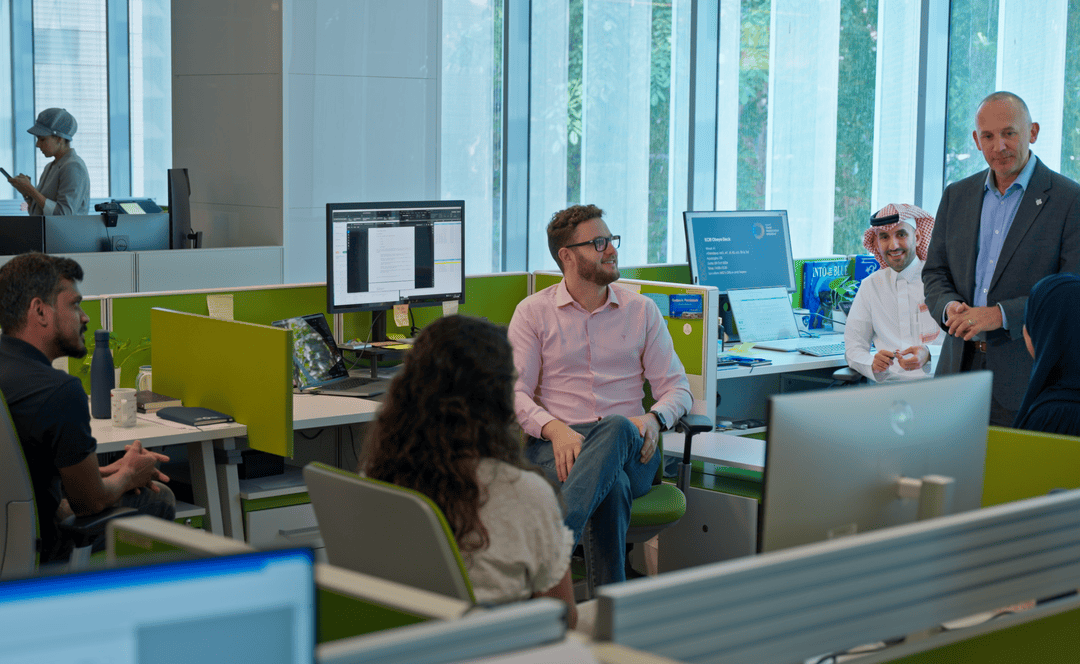National Transformation Institute translates KAUST research into commercial opportunities

Dr. Ian Campbell sets out his vision for the National Transformation Institute at KAUST.
King Abdullah University of Science and Technology (KAUST) is accelerating Saudi Arabia’s innovation agenda through the National Transformation Institute (NTI), led by Scottish biochemist Dr. Ian Campbell, who spent a quarter century building extensive startup, scale-up and consultancy experience before overseeing the U.K. government’s innovation agency.
“When I joined KAUST two and a half years ago, I came here to serve as executive special projects director for the KAUST Coral Restoration Initiative which, for those not aware, is the world’s largest reef restoration project, aiming to plant two million corals over five years,” said Campbell, KAUST Vice President for NTI. Prior to his move to Saudi Arabia, he was executive chair of Innovate U.K., which is part of the governmental U.K. Research and Innovation department.
In 2023, KAUST’s President asked Campbell to take on what he calls a “great privilege” — to be NTI top brass as part of the University’s Accelerating Impact strategy. “KAUST is in a luxurious position of bringing great minds together to solve big problems. The spillover benefit for me is we have fun doing it. We make mistakes, we try to correct them, and we have an actual purpose. There’s meaning to everything we’re trying to do.”
Charged with advancing the Kingdom’s Vision 2030 goals, NTI facilitates collaborations between government, industry and academia, creating jobs and turning research into real-world solutions for climate change, sustainability and economic diversification. Campbell said he is drawn to the rapid progress in the nation and KAUST, citing the University’s ongoing KAUST Coral Restoration Initiative as an example.
“In a normal environment, where NGOs would be doing the coral reef restoration, that’s a 35-year project. The Kingdom’s ambition creates new knowledge. It means we look for new technologies. It means we embrace science earlier. It means we try to scale innovative solutions. It drives new talent development, IP creation, and we galvanize people from across the globe to come here and help us.”
Champion for changemaking; reaching beyond KSA
A “thirst and impatience” for tangible change from Saudi Arabia and its highest authorities, supporting scalable initiatives such as cryogenic carbon capture, hydrogen production, coral reef restoration and sustainable animal feed development — projects aligned with job creation and sustainability — are what drew Campbell to KAUST and his current role. “That’s the mission we’ve chosen to accept within NTI.”
NTI’s 230-member team harnesses KAUST expertise to create a positive impact on society, Campbell said. The institute collaborates closely with faculty, the KAUST central labs and external partners to drive venture creation, consultancy and academic research initiatives. NTI is focused on external partnerships, designing innovative programs, solving real-world problems and preparing skilled labor for future challenges. “We must involve all those to make it successful.”
He added: “NTI aims to reach beyond the walls of KAUST to make an impact and scale, doing that by creating jobs, working with the giga-projects, and enhancing Vision 2030 by dealing directly with government ministries and industries to ensure we move toward the Kingdom’s goals.”
Becoming an innovation ecosystem; talent creation matters
For KAUST to become an innovation ecosystem where academic research can optimally translate into a startup culture, it requires great ideas, funding and intellectual property, Campbell said. Ultimately, this necessitates high-quality people and an ability to commercialize ideas. “We need supply chains. We need logistics. We need customers. Bringing all those together and coalescing them is part of what NTI is trying to do.”
A central NTI aspiration is to accelerate a “virtuous cycle,” where KAUST’s research leads to company creation, supported by industry and government, ensuring a thriving culture of entrepreneurship, he added. Despite KAUST’s globally recognized R&D model, its primary mission remains knowledge creation and human capital development —training talented students, supporting impactful research, and building a sustainable, purpose-driven workforce.
“The Kingdom produces great graduates. We are fortunate enough at KAUST to get the pick of those at this postgraduate University. Clearly, if you want to diversify the economy into different areas aligned with the Kingdom’s research, development, and innovation pillars, then you need associated skills. You need regulations. You need policymakers. You also need workers.”
Engaging stakeholders; promoting collaboration
When Campbell assumed the NTI role, he relocated several KAUST events to Riyadh to engage key stakeholders. Workshops were created to align with the Research, Development and Innovation Authority (RDIA) pillars, sharing KAUST’s strategy, addressing external challenges and building partnerships.
This approach has increased membership in the KAUST Industry Collaboration Program (KICP) — an initiate that connects KAUST’s research community with businesses and government entities to drive innovation.
“In order to advance the research, we have to understand where the need is. What we’re trying to do is work with industry and government to understand the challenges we face. We’re then starting to look internally and with our partners at how we would potentially address those challenges. Then you get into developing projects, programs and collaborations in order to look at what the solutions might be.”
Outward engagement across the Kingdom is essential as KAUST expands, he added. “Partnerships will be at the heart of everything we do because I don’t think NTI will be successful if it’s just KAUST involvement. In order to be scalable, we need to create opportunities, work to solve problems, and have those ideas and initiatives developed, scaled and adopted. We need to take that view from the start.”

